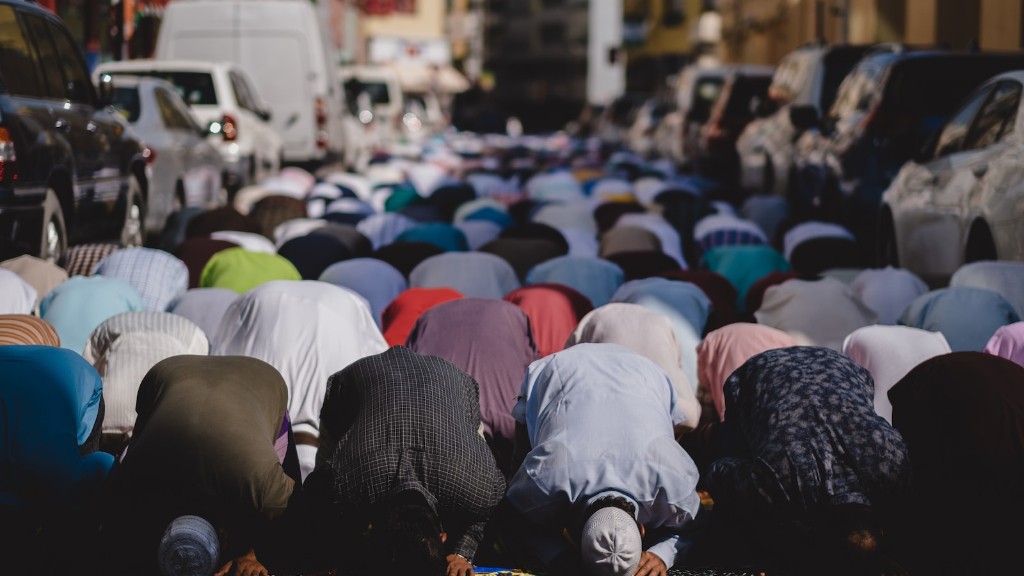Hinduism is an ancient practice that’s been around for centuries, and it is known for its diverse beliefs and practices. A central part of Hinduism is the belief in a Supreme God, or Brahman. It is believed that Brahman is the ultimate source of power and the absolute source of knowledge. In this article, we’ll explore who is considered the Supreme God of Hinduism and the different aspects of his worship.
Brahma is the creator god of Hinduism and is venerated as the Supreme God. He is the first and original creator of the universe and is responsible for the creation of the four types of beings—gods, demi-gods, humans, and demons. He is thought to be an aspects of the divine trinity, or Trimurti, which also includes Vishnu and Shiva. Brahma is often depicted with four faces, representing the four directions. In addition, he is sometimes depicted holding a scepter and a book, representing knowledge and authority.
Vishnu is the preserver god of Hinduism and the second of the Trimurti. He is the divine protector of the universe and is responsible for maintaining balance and order. He is typically depicted as a four-armed blue god, holding a conch shell, wheel, lotus flower and a mace. Vishnu has avatars, or divine forms, that appear when necessary to restore order, such as Krishna and Rama. Finally, Shiva is the destroyer god of Hinduism and is the third of the Trimurti. He is responsible for destruction in order to create balance. Shiva is usually depicted as a blue-skinned god with four arms and is often adorned with the crescent moon and serpent. He is often shown in deep meditation or dancing.
Hinduism also encompasses other deities and gods, such as Ganesha, Saraswati, Kali, and Lakshmi. Hindu deities are worshipped during certain religious ceremonies and festivals. Worshipping can include chanting mantras, offering flowers and food, performing puja, or rituals in honor of the deity. Hindus also often make pilgrimages to temple shrines dedicated to a particular deity to seek a blessing.
In terms of the hierarchy of gods and deities, the Trimurti — Brahma, Vishnu, and Shiva — are at the top, followed by other gods, then demigods, then humans, and finally demons. Some Hindu traditions believe that the gods exist in a hierarchy in which they hold a specific level of power, and that the Supreme God is ultimately responsible for the functioning of the universe.
Hinduism has a long and complex history, and there are a variety of opinions about who is the Supreme God. The Trimurti of Brahma, Vishnu, and Shiva have traditionally been held up as the supreme gods. However, some Hindu traditions believe that the gods are all part of the same divine unity and that no one god has any more power than any other. No matter what interpretation of the gods a Hindu lives by, it is clear that Hinduism is a rich and complex belief system, and that its gods are an integral part of its practice.
Modern Perspectives and Insights
In modern times, Hinduism has become increasingly globalized. Along with branching out geographically, Hindu practices are taking on more of a universal quality and are becoming more popular among different cultures. Many people, regardless of religion, are now starting to associate with the principals of the religion and the importance of its gods and goddesses.
As Hinduism continues to spread and influence different cultures, people are taking different perspectives on who is the Supreme God of Hinduism. Some believe that the Trimurti of Brahma, Vishnu, and Shiva should be held up as the ultimate gods, while others claim that the gods are all equal and no one is supreme. Additionally, some Hindus view their greatest deity as the one that most relates to the individual, rather than one of the gods in the Trimurti.
Despite these varied perspectives, the biggest insight that can be drawn from Hinduism is its focus on accepting differences and celebrating diversity. The deities of Hinduism each have distinct qualities and characteristics, allowing individuals to connect to whatever aspect resonates with them the most. As a result, Hindus are able to practice their religious beliefs in varied ways, making for a very rich and expansive spiritual practice.
Role of Rituals and Practices
While who the Supreme God is may vary in different Hindu traditions, there is a general agreement that rituals and practices associated with the gods are an important part of the faith. Various offerings and prayers are part of the religious ceremonies and rituals, in honor of whatever god or goddess is being venerated.
In addition, a significant ritual in Hinduism is the puja, or ritualistic offering and worship of a god or goddess. During a puja, offerings of fruit, flowers, and incense are made, and mantras or prayers are chanted. This ritual is designed to invoke the blessings or protection of the gods. Hindus also often make pilgrimages to their temples to honor particular gods.
Overall, rituals and practices help Hindu individuals to become more connected to their beliefs, as they cultivate a deeper understanding and respect for the divine. These rituals help people to create a relationship with the deities and to be more in tune with the spiritual world. As a result, these practices are essential in fulfilling the religion’s mandate of harmonious living.
Sacred Scriptures and Texts
The sacred texts of Hinduism, known as the Vedas, are considered to be the main source of spiritual knowledge. These texts are believed to be divinely revealed and contain information about the gods and spiritual practices of the faith. The four Vedas include the Rig Veda, the Yajur Veda, the Sama Veda, and the Atharva Veda. Each of these texts contains hymns, poems, incantations, rituals, and religious information about the gods.
In addition to the Vedas, several other texts also provide invaluable information about Hinduism. These include the Upanishads, the Bhagavad Gita, the Puranas, and the Agamas. Each of these texts explain different aspects of the Hindu faith, and they are studied by both adherents and scholars of the religion. Ultimately, these scriptures are a source of wisdom and guidance that can help Hindus deepen their connection with the Supreme God.
Theology and Beliefs
Different Hindu beliefs and practices may vary, but there are some overarching theological concepts that are shared across all traditions. One of these is the concept of Brahman, or the absolute. Brahman is understood to be the underlying essence of creation, and is seen as the source of all truth, ever-existing and eternal. In some traditions, Braham is viewed as the Supreme God or ultimate power that permeates all of creation.
In addition, many Hindus reject the idea of a personal or anthropomorphic god, and instead focus on divine potentiality or impersonal power. As such, there is an emphasis on the spiritual power of meditation and reflection, which can be used to tap into the divine nature of the universe. Ultimately, Hindus believe that the Supreme God is present in all life and that this can be experienced by connecting to the power and energy of the divine.
Implications of Beliefs and Practices
The beliefs and practices associated with Hinduism have significant implications for daily life. Primarily, these beliefs emphasize the importance of unity in diversity. Hindus seek to recognize and honor the relationships between people, the gods, and the natural world. This includes emphasizing the importance of honoring one another, the gods, and nature, and fostering a sense of interconnectedness and harmony.
In terms of spiritual practices, Hindus believe that prayer and meditation help to cultivate a deeper understanding and connection to the divine. Focusing on mantras and prayers can help to bring awareness to the divine aspect of the universe and to understand the importance of living in harmony with it. Additionally, studying sacred texts can also provide deeper insights into the nature of the Supreme God and the spiritual practices associated with it.
Conclusion
Hinduism is an ancient faith with many diverse beliefs and traditions. A key part of Hinduism is the belief in a Supreme God, or Brahman. While there are many interpretations of who this god may be, it is clear that the gods and goddesses of Hinduism are integral to its practice. Hindus celebrate their faith through rituals and practices, participating in puja and pilgrimages, and studying sacred scriptures. Ultimately, it is believed that understanding and connecting to the Supreme God and the other deities of Hinduism is vital to the spiritual development of an individual.

